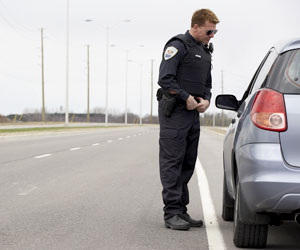 Aug. 11, 2014 – When searching a car with the driver’s consent, police found a briefcase. The briefcase owner, passenger Derik Wantland, asked whether police had a warrant to open it. Recently, the Wisconsin Supreme Court ruled (4-3) that police didn’t need one.
Aug. 11, 2014 – When searching a car with the driver’s consent, police found a briefcase. The briefcase owner, passenger Derik Wantland, asked whether police had a warrant to open it. Recently, the Wisconsin Supreme Court ruled (4-3) that police didn’t need one.
In State v. Wantland, 2014 WI 58 (July 11, 2014), the supreme court majority upheld Wantland’s conviction for possession of a narcotic, concluding the search of Wantland’s briefcase, which contained morphine, did not violate the Fourth Amendment.
“We conclude that Wantland did not effectively withdraw the driver’s consent when he asked ‘Got a warrant for that?’ Further we conclude that police officers confronted with ambiguous statements, such as Wantland’s, are not under a duty to ask follow-up questions to clarify the ambiguity,” wrote Justice Annette Ziegler for the majority.
Police stopped a vehicle for a cracked windshield and a defective brake light. Wantland’s brother was driving and Wantland was a passenger. The police, who knew Wantland was a repeat drug offender, issued a written warning and told them to go.
But as the officer was walking back to his squad car, he turned and asked whether the car contained anything “that should not be there.”
Wantland’s brother, Dennis, said he didn’t think so. Then the officer asked to search the vehicle and Dennis agreed to the search. The officer observed tools and toolboxes in the back hatch of the car, and he also noticed a briefcase. He asked what was inside.
“A laptop. Uh. Got a warrant for that?” Derik Wantland suddenly spoke up. The officer disregarded Wantland’s question and opened it. He found a laptop, some eye drops, personal papers, and an acid reflux bottle, which contained morphine pills.
The state charged Wantland with possession of narcotic drugs without a prescription. Wantland moved to suppress the evidence obtained in the briefcase. He said the search violated his constitutional right to be free of unreasonable searches and seizures.
Wantland said that any consent given by his brother to search the vehicle did not extend to the briefcase, because he claimed ownership of it by asking if the officer had a warrant to search it. The state argued that Wantland’s question was not sufficient to withdraw consent. The Sheboygan County Circuit Court agreed with the state.
A state appeals court upheld the circuit court’s ruling, and a supreme court affirmed. Justice Ziegler wrote the opinion, Joined by Justices Patience Roggensack, Michael Gableman, and Patrick Crooks to form the majority. Chief Justice Shirley Abrahamson and Justices Ann Walsh Bradley and David Prosser dissented.
Majority Rules
The majority noted that Wantland’s brother gave consent to search the vehicle, and the brother had apparent authority over everything inside the car. The majority rejected Wantland’s claim that asking about a warrant was sufficient to withdraw consent.
“Wantland’s inquiry ‘Got a warrant for that?’ was equivocal, such that it did not clearly withdraw the otherwise valid consent of his brother, the driver,” Ziegler wrote.
Unlike the defendant in other cases, the majority explained that Wantland did not ask the officer to stop the search or take steps to prevent access to the briefcase.
“Rather, Wantland did little to indicate that he owned the briefcase and the officer was not free to search the briefcase,” wrote Zeigler, noting that “case law does not support the notion that Wantland’s question … was sufficient to constitute a withdrawal. …”
Finally, the majority rejected Wantland’s claim that officers have a duty to make further inquiries about ownership of a closed container if ownership or authority is unclear.
“We conclude that law enforcement is not under such a duty to further inquire,” Justice Ziegler wrote, noting that a contrary rule would place an onerous burden on police if required to halt valid searches based on ambiguous statements about ownership.
Dissenting Opinions
Justice Prosser wrote a dissenting opinion, joined by Chief Justice Abrahamson and Justice Bradley. Prosser noted that the police officer used “consummate skill” in a “tactic reminiscent of Lieutenant Columbo” to procure a search of the car and its contents.
He said the officer, who knew Wantland was a convicted drug user when he asked to search the car, crossed the line of constitutionality when searching the briefcase.
“This is a consent case,” Justice Prosser wrote. “The officer had no probable cause or reasonable suspicion to conduct a search.” He said the validity of the consent should be assessed under the “totality of the circumstances” and Wantland raised a red flag.
“In my view, the defendant withdrew any ‘consent’ to search his briefcase, and the officer simply disregarded him,” Justice Prosser wrote.
Chief Justice Abrahamson wrote a separate dissent. She said the “facts coming to light during the search” should have caused a “reasonable person” to doubt that the driver, Wantland’s brother, had authority to consent to a search of the briefcase.
“The test is whether a reasonable officer would believe under the totality of the circumstances that the consenter had authority to consent to the search,” she wrote.
